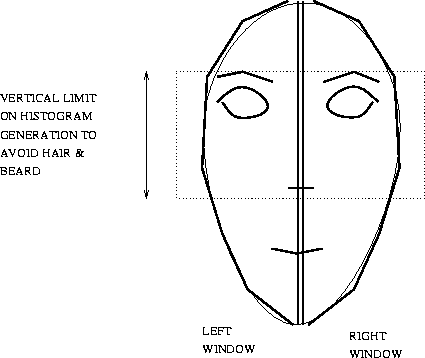



Next: Gradated Histogram Fitting
Up: Shading and Lighting Normalization
Previous: Windowing Histogram Analysis
Phillips and Vardi's technique [33] produced particularly poor
results when the individual had a beard or other facial hair. The algorithm
brightens the dark hair regions unnaturally. Consequently, the regions of the
face that were likely to be obstructed with hair were omitted from the
histogram generation process (both in the mean face and in new faces). Thus
the inverse histogram mapping does not over-brighten the face to account for
these extreme regions. The generation of Hl(i),Hr(i),
 and
and
 was limited vertically to cover only the
eyebrows down to the nose as shown in Figure
was limited vertically to cover only the
eyebrows down to the nose as shown in Figure ![[*]](http://vismod.www.media.mit.edu/vismod/support/latex2html-98//cross_ref_motif.gif) . However,
we still apply the mappings in
. However,
we still apply the mappings in
 and
and
 to the whole face as in Figure
to the whole face as in Figure ![[*]](http://vismod.www.media.mit.edu/vismod/support/latex2html-98//cross_ref_motif.gif) . Thus, the
illumination is corrected for quite nicely in the case of bearded individuals
and other unusual cases.
. Thus, the
illumination is corrected for quite nicely in the case of bearded individuals
and other unusual cases.
Figure 4.19:
Limiting histogram generation to avoid hair and beards.
 |
Tony Jebara
2000-06-23

![[*]](http://vismod.www.media.mit.edu/vismod/support/latex2html-98//cross_ref_motif.gif) . However,
we still apply the mappings in
. However,
we still apply the mappings in
![[*]](http://vismod.www.media.mit.edu/vismod/support/latex2html-98//cross_ref_motif.gif) . Thus, the
illumination is corrected for quite nicely in the case of bearded individuals
and other unusual cases.
. Thus, the
illumination is corrected for quite nicely in the case of bearded individuals
and other unusual cases.